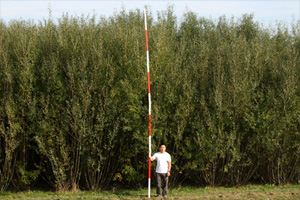 CALS will continue to evolve its education program [Cornell Chronicle 10/19/2012] – Reaccreditation for the Master of Arts in Teaching (MAT) will not be pursued when the current accreditation expires Dec. 31, 2013. “We are committed to ensuring that our current students have every opportunity to certify as teachers,” said Travis Park (right), director of the Cornell Teacher Education Program (CTE), based in the Department of Horticulture.
CALS will continue to evolve its education program [Cornell Chronicle 10/19/2012] – Reaccreditation for the Master of Arts in Teaching (MAT) will not be pursued when the current accreditation expires Dec. 31, 2013. “We are committed to ensuring that our current students have every opportunity to certify as teachers,” said Travis Park (right), director of the Cornell Teacher Education Program (CTE), based in the Department of Horticulture.
Researchers test how school gardens foster healthful habits [Cornell Chronicle 10/17/2012] – At 15 low-income schools spread across six New York counties, elementary students are growing fruits and vegetables — and their minds. With Cornell’s help, the students are participating in the Healthy Gardens, Healthy Youth project, which seeks to encourage young children to eat more fruits and vegetables at school and at home, boost their activity, and enhance their knowledge of nutrition and food systems. Liz Falk, an extension educator with the Department of Horticulture’s Cornell Garden-Based Learning Program, has been actively involved in developing the project’s Educational Toolkit that supports classroom and garden learning. See also School gardens sprout up across nation to curb obesity [Cornell Chronicle 10/17/2012]

Research Leads to Profitable, Sustainable Approaches to Onion Production – [Northeast SARE From the Field Profile] – Cornell University Extension Vegetable Specialist Christine Hoepting is using a series of USDA-SARE grants to investigate new approaches from conservation tillage to mulches to planting techniques to soil fertility to solve onion-growers’ problems. See also: New onion cultural practices help boost profits, protect soil [The Grower 10/9/2012]


